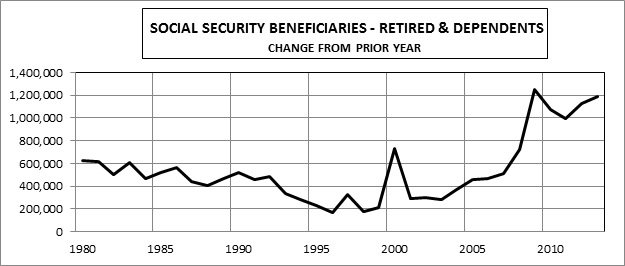Why are Wages Weak?
June 17, 2014
We have been wondering lately why wages growth has been so weak during this expansion. Many argue that the unemployment rate does not reflect the true slack in the labor markets, and that it is the potential for those not currently in the workforce to re-enter that is holding back wage demands. Maybe, but many who have left the workforce have retired. We suspect that for many it would take a large wage increase to reverse the decision to trade work for a lower income but more leisure. However, retirement of the baby boom may be providing corporations with a golden opportunity to adjust wages across the age spectrum. Since 2009, when the first boomers hit 62, social security roles have been increasing over one million a year (half of retirees take benefits when first available) compared to much lower numbers when the baby bust of the depression and war years were retiring. This allows two to three times as many opportunities as usual to move employees up the ladder – but not necessarily at the same wages as the folks who had the job before. Firms have often used employee buyouts to right size compensation – hiring younger, cheaper employees even as they let go retirees. For the next decade, social security will be providing baby boomers their buyout offer. Will this limit wage growth compared to traditional post war cycles?
The preceding is an abridged version of a commentary for McVean Trading and Investments, LLC and has been reposted here with permission of the author.
The ideas and opinions expressed in this blog are those of the author, and they should not be perceived as investment advice or as any other kind of advice.


Leave a Reply
You must be logged in to post a comment.